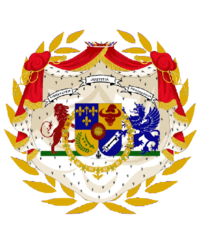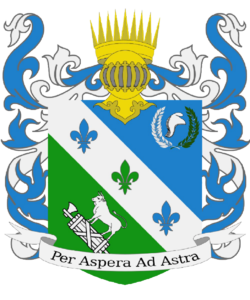Senate of Efransa
Senate of Efransa Sénat od Elfransa | |
|---|---|
| First Quarter of Business | |
 | |
| Type | |
| Type | Upper House of the [[Parliament]] |
| Leadership | |
His Majesty the King, Nonpartisan since April 19, 2020 | |
Chairman Pro Tempore | The Duke of Arreau, Nonpartisan since June 1, 2020 |
| Structure | |
| Seats | 4 |
 | |
Senate political groups | All
|
| Senate committees | Foreign Relations, Defense, Committee of the Whole. |
| Elections | |
Senate voting system | Appointment by the King |
Senate last election | April 15, 2020 |
Senate next election | N/A |
| Meeting place | |
| Legislative Table, Limone, Pormalia | |
The Senate of the Kingdom of Efransa (Efrasachin: Sénad du Rouiame od Elfransa) the upper house of the Parliament of Efransa. The Senate consists of four Senators who serve at His Majesty’s pleasure and are appointed by the King, who also chairs the Senate but does not vote. Although, the Sovereign may introduce legislation through this office.
Then Senate acts as an unelected scrutinizer of bills. But, the Senate also has the power to pass and create legislation, much like the National Assembly. However, unlike the National Assembly, the Senate refusing to pass legislation can be overridden by a 4/5 supermajority in the National Assembly. The Senate also has the powers of oversight over the Foreign Policies and the military of the nation, in association with the Sovereign.
History
For most of history, legislatures in the territory of Efransa have been bicameral, Ludisirga and the Maradian Transitional Government are the two exceptions.
The Senate originated as the House of Barons of the Grand Senate of the County Palatine of Maradia. Though, the Grand Senate was effectively unicameral, it had a qualified unicameral system similar to Norway until 2009. The House of Barons was supported by the House of Baronets.
The upper house was either known as the Senate or the Chamber of Senators for the rest of history, with a small period of the Federal Council during the Tribarcasian Federation. Notably, it has been known as the Chamber of Senators solely during periods of federalism, such as the Union or the Empires.
The modern Senate originated with the 2020 Constitution, as the first entirely appointed Senate, all had either been either entirely or partly directly or indirectly elected prior to that. The Senate was historically the privy council, but his has been delegated to the Council of the Nation.
Structure
The King serves as the constitutional President of the Senate, and does not regularly preside over the body, while the President Pro Tempore does. Each Senator serves at the pleasure of the King, but normally they serve for as long as a government lasts.
The Senate is divided into three Committees: the Committee of the Whole; Committee on Foreign Relations; and the Committee on Defense.
Powers
The primary power of the Senate is to create legislation, it is an almost equal partner to the National Assembly. Both chambers can refuse to pass legislation created by the other, but only the National Assembly can override the Senate’s refusal to pass legislation only when it originates in the Assembly.
The Senate also has almost exclusive power in regulating the Foreign Service and Royal Army. The Senate also has the authority to reject treaties, a power only held by the Senate, and the King. The Minister of Foreign Relations is also traditionally a member of the Senate.
